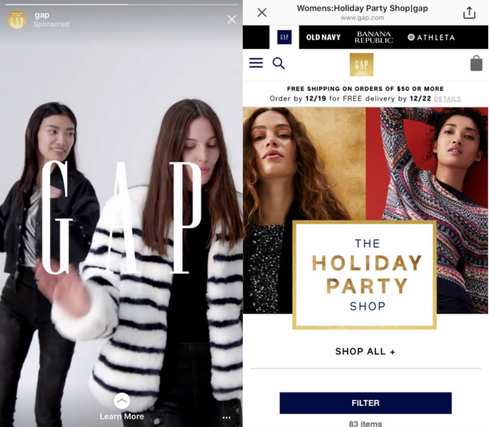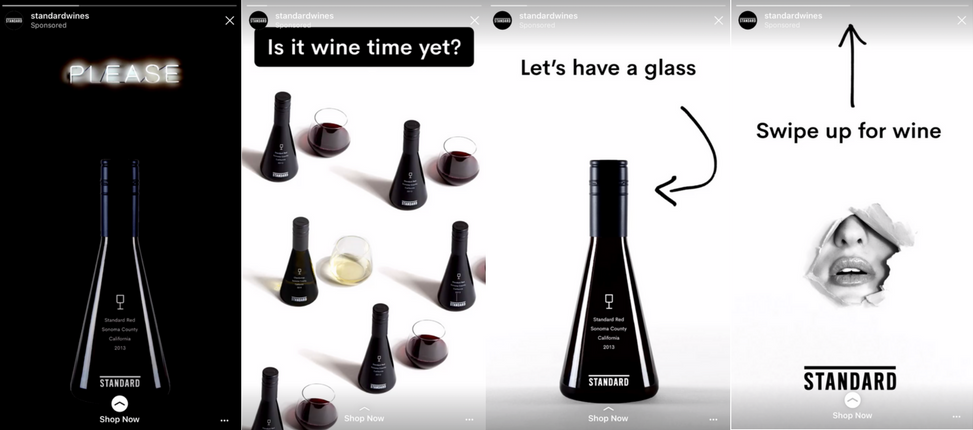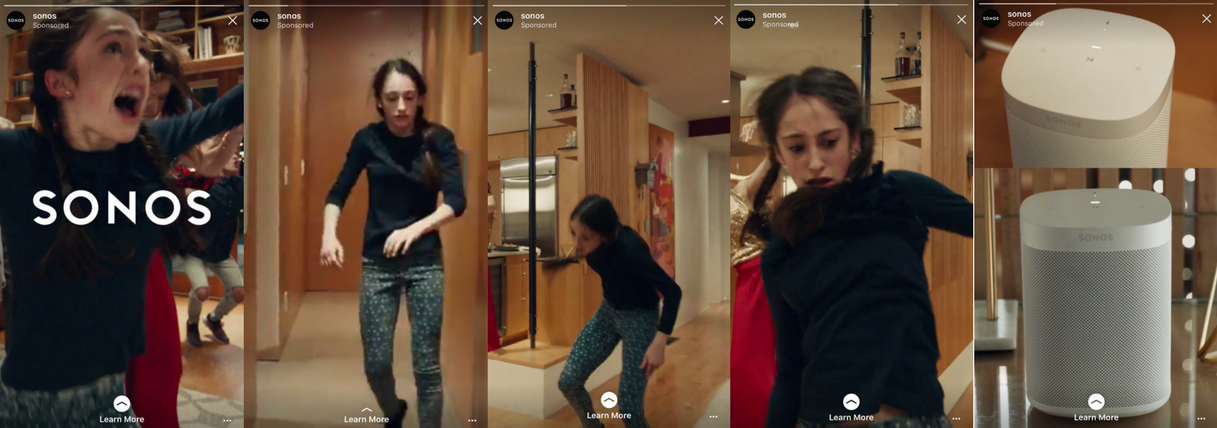The number of users keep climbing for Instagram Stories. The network’s feature hit 250 million daily active users in June 2017 and doesn’t look like it’ll be slowing down anytime soon.

In March 2017, Instagram released advertising in Stories as a global feature, offering brands yet another paid opportunity to reach more people. And in September 2017, the network added full-screen, interactive Canvas ads to Stories.
Instagram Stories Ads are available for any Instagram account with a business profile. They pop up in between the Stories of accounts you follow and if targeted correctly, can have a high impact.
Since Stories have generally been used as a grittier, more authentic version of Instagram posts, users find interest in watching them.
Here, you’ll learn best practices for your own Instagram Stories Ads and how to execute for the best ROI:
Make the First Half Second Visually Appealing
You have a choice in Instagram ads to create either a video or a photo. Either way, you want that initial image that’s shown to the user to be attention grabbing. You need to catch the eyes of those who speed tap through watching Stories.

Gap used a short video of women dancing in holiday party clothes. The video alone was eye-catching but their overlaid logo made it clear who the company was. Clicking through led straight to their holiday shop for women.
Make the Brand Name Visible
Unless you’re Nike or Coca-Cola, you want to go straight in with your product and brand. Subtle storytelling won’t do very well in Stories since people tend to tap through their feed.
To make your brand name stand out, you have a few options:
- Overlay your logo in a predominant way
- Begin the video by focusing on your product
- Use a simple font and minimal styling to make your name stand out

In the Standard Wine example above, they utilize a combination of the above methods. The starting image is minimalistic, high contrast and begins with a shot of the product. It quickly moves on in a video to more eye-catching filmography. They also add a touch of casual with their drawn-on arrows and “Is it wine time?” phrase in an Instagram Story text style.
Add Music
Much like the first piece of advice, use music to your advantage. Attention-grabbing music can set the scene of the ad and draw watchers into the video.

Sonos paired up a video with dance music to show how their product can be used at home. It begins with an impossible-to-miss Sonos name overlaid and then segues flawlessly into dancing in the hallway. The end is a simple product shot.
Be Highly Relevant
This is Marketing 101. Structure your creative and ad content to be in line with the advertising goal. If you want more clicks to your website, make sure the content is so relevant to the audience that they can’t resist clicking through. In this sense, it also means that you should choose your audience very carefully.
Some ideas for high relevancy include:
- A blog post timed for a holiday
- A how-to guide that solves an important need
- A specific product they’ve been eyeing. This is especially relevant if it’s an ad that’s retargeting your customer base.

Artifact Uprising served up this short ad with only two photo shots. The design is simple and the content is relevant. It’s the holiday season, Instagrammers are especially into photography and it’s free information. Swiping up leads you to their blog post on photographing for the holidays. It’s especially relevant for us since we visited the website mere days before seeing the ad.
Use Stories Ads to Stay in Touch With Current Customers
Since Instagram’s feed became algorithmic, brands have tried various ways of increasing their engagement numbers. One way was to begin using Stories, but Stories also changed to become algorithmic. Instead, to make sure you’re definitely in front of the people who decided to follow you, you need to advertise.
Use Instagram Stories Ads to share new products or company initiatives with your current customers. They’re the ones who have opted in to following you already and should be excited about more news about what your company is doing. One part of marketing is staying true to your customer base and not forgetting about them while you’re seeking out new customers.

As part of Starbucks’ Give Good campaign, Spotify partnered up with them to showcase three musical artsits’ non-profit foundations. The ad itself was a video with several animations.
Each artist had a short animation and some text naming their foundation. Visually, the colors stand out and everything is minimal. This ad works because it’s not advertising a free trial to an existing Spotify customer. Instead, it thinks that an existing customer might care about what the company’s newest project includes.
Use Influencers as Part of Your Advertising
If you already have an influencer marketing strategy in place, why not use some of the content created for paid advertising? The ad you create can be an extension of already existing content or it can lead to new information.

Wild Turkey’s Instagram Story Ad features Matthew McConaughey in a short video preview. The video is short with the important text overlaid. If you wanted to know more about what he thinks about bourbon, swiping up would lead you to the full video. Even if you don’t swipe up, the ad still works because now you know that he endorses the brand.
Structure the Ad as Helpful Content
Give the audience what they’re looking for by serving the content straight in the ad. If they want to learn more or shop the content, the CTA will always be there for them. Whether it’s a how-to guide or a list, see if you can deliver the message without making the user click on anything.



In this example, Madewell took full advantage of the maximum 15-second video limit to cram in all of the products they think would be on a holiday shopping list. They used a combination of video animation, music pairing and simplicity to get their point across.
How to Get Started with Instagram Stories Ads
Begin with content that you know will appeal to your currently subscribed audience. If you’re a cafe, serve an ad that your current customers want to see, like a new drink or a holiday gift set. They’ll be the ones who are most likely to engage with your ad.
Once you have the hang of creating Stories Ads, you can expand to other objectives and fresh content. A full walkthrough on Instagram ads is available in our guide.
1. Choose Your Objectives
Currently, there are a few objectives available for Instagram Stories Ads:
- Reach
- Video views
- Conversions
- App installs
- Lead generation
- Traffic
While more may be added later, you want to make sure one of these is selected in order to create an ad for Instagram Stories.
A Better Way to Manage Social
A Better Way to Manage Social
2. Create Your Relevant Content
We gave you some helpful tips earlier on creating content that your audience might care about. After you’ve decided on your advertising goal, you then want to design the content that best fits the goal.
If you’re just starting out, stick with a minimal look, high contrast in colors and some animation to grab attention quickly. You can preview how your ad might look in Ads Manager or in Creative Hub.
3. Stick With the Recommended Dimensions
This is where creating content for your placement is especially helpful. The full-screen dimensions for Stories Ads is different from a Facebook newsfeed Ad or sidebar ad. In our constantly updated social media specs guide, we recommend the below for videos:
- Recommended resolution is 1080 x 1920.
- Minimum resolution is 600 x 1067.
- Aspect ratio is 9:16.
- Max file size is 4GB.
- Recommended video formats are .MP4 and .MOV.
- Video length max is 15 seconds.
4. Target Your Audience
Since the attention span is shorter for watching Stories, we recommend being very selective in your audience targeting. This means taking full advantage of Facebook’s Pixel, retargeting options, current followers and lookalike audiences.

5. Select Your Stories Placement
Despite Facebook Ad Manager recommending automatic placements, we suggest fine tuning your advertising to specific placements. You know your audience best. If your audience on Facebook is drastically different from your audience on Instagram, then it doesn’t make sense for you to show the same ad.

When you’re editing the placement, you can select Stories only.
6. Add Your Call to Action
Even if your ultimate objective is to reach the greatest number of people, adding an call-to-action at the bottom of your ad can still be helpful for those interested in learning more.

The above ad grabs you in with the single image and if you’re interested in purchasing, the link is available to you.
7. Analyze Both Ads and Instagram Account
In conjunction with analyzing how well your ad performed, make sure you also take a look at your account’s analytics.

Note when your campaign began and see if it correlates with any upticks in metrics for your account. Ideally, an advertising campaign would help gain more followers, increase in engagement rate and increase in profile views.

With Sprout Social, you can track engagement on your Instagram ad comments to see who’s reacting to each regular post. Combining those analytics with Facebook’s own data on your Stories, you’ll be well armed with measuring success!
Now that you have some solid examples and a quick guide on setting them up, you’re well on your way to executing your own Instagram Stories Ads. We’d love to hear more on what you’ve found worked or didn’t work. Comment below or reach out to us on Twitter @SproutSocial.
